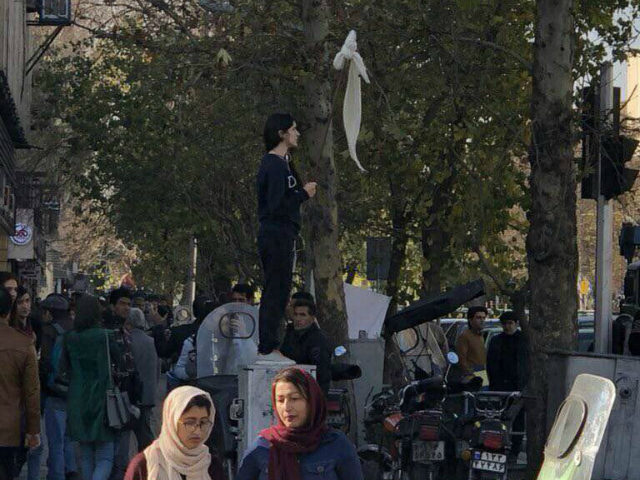Iranian media reported on Friday that police in Tehran have arrested 29 women for appearing in public without wearing a hijab, the Muslim headscarf that is mandatory for women under Iranian law.
Some of the women in question were deliberately defying the hijab law to protest its injustice, as in the case of one detainee who reportedly waved her headscarf around on the end of a stick in a street protest. Another woman named Shima Babaei took off her hijab in front of a court to make her dedication to the protest clear:
Her name is Shima Babaei who joined #WhiteWednesdays campaign protesting compulsory hijab. she was arrested yesterday. She was the one toke off her hijab in front of the court to say #NoForcedHijab#FreeShimaBabaeei
##FreeHijabProtesters #معترضان_حجاب_اجبارى_را_آزاد_كنيد pic.twitter.com/35OCqzkD9Z— Masih Alinejad 🏳️ (@AlinejadMasih) February 2, 2018
Supporters of the movement have created #FreeShimaBabaeei and #FreeHijabProtester hashtags on Twitter to monitor the cases. The movement has been dubbed #WhiteWednesdays and has its own hashtag, as well as a social media presence under its formal name, My Stealthy Freedom.
“For almost four decades, we, the women of Iran, have been unhappy about compulsory hijab, and we had the fear inside our hearts. But now … I think the government of Iran, they have the fear of these brave women,” founder Masih Alinejad told CBC Radio on Wednesday.
Alinejad, who grew up in Iran but now lives in “self-imposed exile” in New York, said she established the My Stealthy Freedom Facebook page so Iranian women could post photos of themselves defying the hijab law.
The BBC reports her page now hosts over 200 videos, some of which have accumulated over half a million views. Alinejad said contributors have told her they would rather risk their jobs, and even their safety, than continue living under the oppression of the hijab law. She also noted that she has received contributions from other Muslim countries, such as Saudi Arabia, and even from women living in the West.
“Even if this leads me to jail and sleeping with cockroaches, it would be worth it to help the next generation,” one White Wednesdays participant declared.
The BBC notes that Alinejad herself has been labeled a “prostitute” and threatened with death by Iranian media, which explains why she prefers to live in New York.
CBC Radio quoted University of Toronto women’s studies professor Shahrzad Mojab, who observed that older Iranian women have lived long enough to be both forced to wear the hijab by Ayatollah Khomenei’s Islamist revolution, and forbidden from wearing it under the Shah. Alinejad said she simply wants Iranian women to have a choice about whether they wear one or not. Some of the demonstrators wear Islamic garb themselves while waving hijabs on the end of sticks, declaring they love the hijab themselves but want other women to be allowed to choose.
“When the regime calls itself an Islamic regime, women become the political-cultural symbol of that regime, and therefore monitoring, managing, punishing, disciplining a woman’s body and their sexuality becomes a very important political policy,” Mojab said.
Alinejad added that mandatory headscarf laws are also insulting to men, as they presume men are incapable of controlling their sexual urges when they see uncovered women. Europe has lately been discovering that assimilating men who have been taught to think that way since childhood into Western society can be very difficult.
The Iranian regime, of course, is floating conspiracy theories that the anti-hijab movement is the work of foreign agitators seeking to undermine the Islamic Republic. The authorities have also claimed that women were “deceived” into removing their hijabs.
Alinejad noted that some of the women arrested in the crackdown have been slapped with penalties and bail amounts far in excess of what Iranian law allows.
The UK Daily Mail notes that despite claims by “moderate” President Hassan Rouhani that the police have better things to do than enforcing the hijab law, thousands of undercover “morality police” remain active, filing tens of thousands of “bad hijab” reports. A common report involves women allowing their headscarves to drop while riding in cars, an offense that can result in the car being impounded.
Further promises to relax the hijab law were made by the Iranian government as it struggled to control the December uprising, but the new crackdown suggests the regime now feels secure enough to disregard those promises.
Women protesting the hijab are sometimes referred to in Iran as “girls of Enghelab Street,” which is a reference to the original heroine of the movement, Vida Movahed.
Movahed, the 31-year-old mother of a 20-month-old daughter, became a global sensation in December when she defiantly removed her hijab and tied it to a stick during widespread protests against both the secular and religious halves of the Iranian government. She and her daughter were both imprisoned by the thuggish regime and held incommunicado without proper charges, prompting the creation of a #WhereIsShe social media movement demanding her freedom. According to a human rights lawyer who took up her case, she was finally released from detention last weekend.
“I hope they don’t fabricate a legal case to harm her for using her basic rights. She has not done anything wrong to deserve prosecution. Hands off her please,” lawyer Nasrin Sotoudeh said.

COMMENTS
Please let us know if you're having issues with commenting.